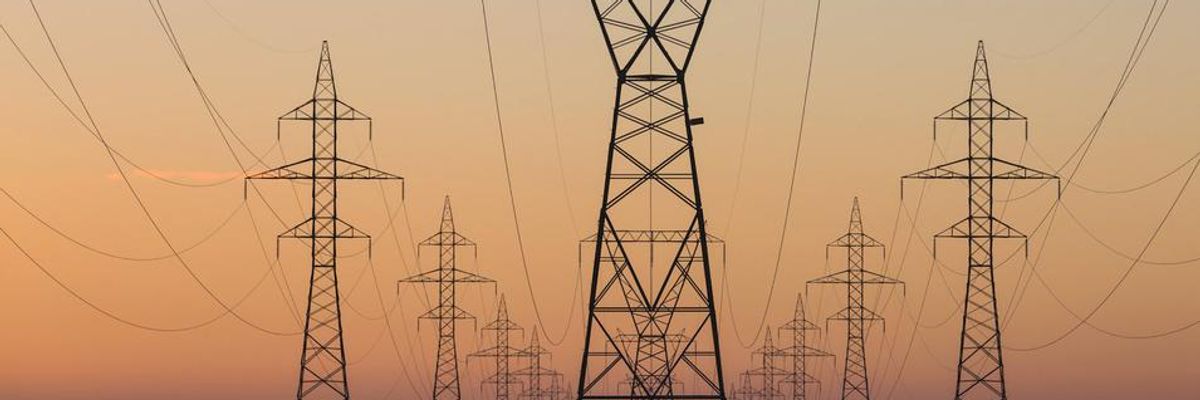Over a dozen leading U.S. utility companies took more than a billion dollars of publicly-funded pandemic bailout money while pulling the plug on power to vulnerable households nearly a million times, according to a new report out Thursday.
"It is clear that private utilities prioritize profits and shareholder satisfaction over all else, including customer health and the climate."
--Chris Kuveke, BailoutWatch
The Center for Biological Diversity and BailoutWatch report--entitled Powerless in the Pandemic: After Bailouts, Electric Utilities Choose Profits Over People--details how utilities used their political power "to secure bailouts that cost taxpayers $1.25 billion, cushioning them from the pandemic economy," while disconnecting vital services from some of the most vulnerable U.S. households.
As they successfully lobbied for tax-code changes in the Coronavirus Aid, Relief, and Economic Security (CARES) Act, the utilities highlighted in the report defied calls from progressive advocates to shield their customers from devastating shut-offs.
"Already a national embarrassment, the practice of disconnecting household electric service for unpaid bills... became a lethal threat to poor families last year after Covid-19 hit," the report states. "By rendering homes uninhabitable, electric companies made social distancing impossible and increased transience, leading to higher infection and death rates, according to recent research."
"The harm caused by electric shutoffs is indisputable," the report continues. "Less discussed is the nexus of utilities' political influence, predatory collection tactics, and climate impacts... Their profits-over-people collections practices heap further harm onto the poor communities and communities of color already suffering disproportionate climate harm and energy burdens."
Among the report's key findings:
- Nine companies received tax bailouts totaling $1.25 billion. It would have cost just 8.5% of that bailout total to prevent every shutoff reported.
- For what taxpayers spent bailing them out, 15 companies... could have forgiven all unpaid accounts--hundreds of times over in some cases.
- A six-member Hall of Shame--NextEra Energy (parent of Florida Power & Light and others), Duke Energy, Southern Company, Dominion Energy, Exelon, and DTE Energy--perpetrated 94% of all shutoffs documented. NextEra alone accounted for nearly half.
- Duke Energy and DTE Energy together received $845 million, more than 75% of the tax bailout money the report identified in the utility sector. They cut off customers' power more than 203,000 times. Their tax bailouts provided enough unexpected revenue to forgive the underlying unpaid bills more than 150 times.
"From the data we analyzed, it is clear that private utilities prioritize profits and shareholder satisfaction over all else, including customer health and the climate," Chris Kuveke, a data analyst with BailoutWatch, said in a statement.
"These companies took bailout dollars from taxpayers and turned around to lobby against shutoff moratoria proven to save lives," Kuveke added. "Investor-owned utilities' incentives are misaligned if they're not providing people with the basic need of electricity during a crisis. They need stricter regulation."
Jean Su, director of the Center for Biological Diversity's energy justice program, said, "It's appalling that utility companies cut power to countless families throughout the pandemic while raking in taxpayer bailout money."
"This greedy, heartless practice hurts low-wealth communities and communities of color most of all," Su added. "It needs to stop. Complicit state regulators who fail to make shutoff data public should stop cowering and start shedding light on utilities' bad behavior."
In a bid to protect lower-income households from electricity, water, and broadband disconnections during the ongoing pandemic, Sen. Jeff Merkley (D-Ore.) and Rep. Rashida Tlaib (D-Mich.) earlier this year introduced separate legislation aimed at canceling tens of billions of dollars in unpaid utility bills.
"Given utilities' contributions to the escalating climate crisis and their reliance on public assistance during the Covid-19 pandemic, it is imperative that we act to limit the damage inflicted by profit-seeking companies that control basic resources," the report states.
"In a nation of abundance, there is no space for a system whose powerful stakeholders get richer by choosing to harm untold millions of Americans, disproportionately communities of color and poor families, amid a global health crisis."
